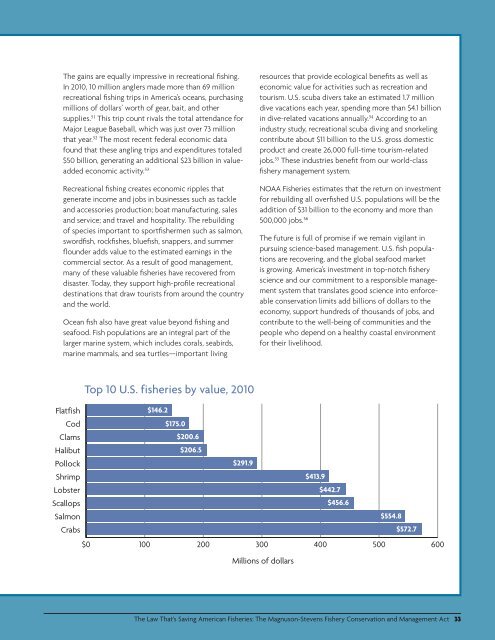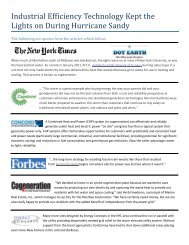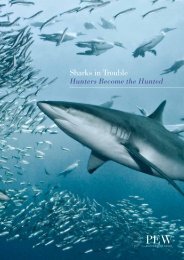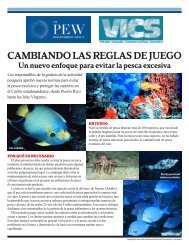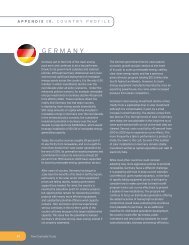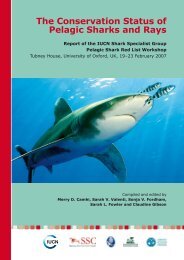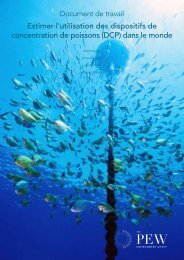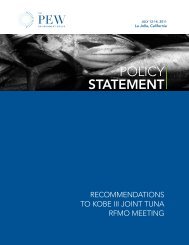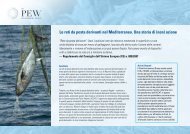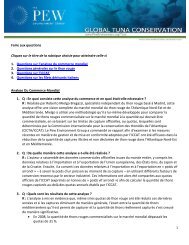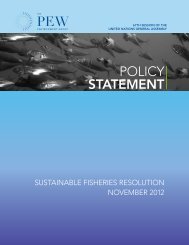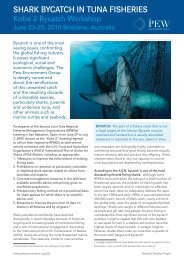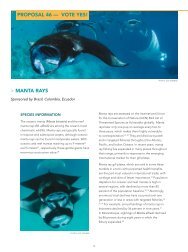The Law That's Saving American Fisheries - Ocean Conservancy
The Law That's Saving American Fisheries - Ocean Conservancy
The Law That's Saving American Fisheries - Ocean Conservancy
You also want an ePaper? Increase the reach of your titles
YUMPU automatically turns print PDFs into web optimized ePapers that Google loves.
<strong>The</strong> gains are equally impressive in recreational fishing.<br />
In 2010, 10 million anglers made more than 69 million<br />
recreational fishing trips in America’s oceans, purchasing<br />
millions of dollars’ worth of gear, bait, and other<br />
supplies. 51 This trip count rivals the total attendance for<br />
Major League Baseball, which was just over 73 million<br />
that year. 52 <strong>The</strong> most recent federal economic data<br />
found that these angling trips and expenditures totaled<br />
$50 billion, generating an additional $23 billion in valueadded<br />
economic activity. 53<br />
Recreational fishing creates economic ripples that<br />
generate income and jobs in businesses such as tackle<br />
and accessories production; boat manufacturing, sales<br />
and service; and travel and hospitality. <strong>The</strong> rebuilding<br />
of species important to sportfishermen such as salmon,<br />
swordfish, rockfishes, bluefish, snappers, and summer<br />
flounder adds value to the estimated earnings in the<br />
commercial sector. As a result of good management,<br />
many of these valuable fisheries have recovered from<br />
disaster. Today, they support high-profile recreational<br />
destinations that draw tourists from around the country<br />
and the world.<br />
<strong>Ocean</strong> fish also have great value beyond fishing and<br />
seafood. Fish populations are an integral part of the<br />
larger marine system, which includes corals, seabirds,<br />
marine mammals, and sea turtles—important living<br />
resources that provide ecological benefits as well as<br />
economic value for activities such as recreation and<br />
tourism. U.S. scuba divers take an estimated 1.7 million<br />
dive vacations each year, spending more than $4.1 billion<br />
in dive-related vacations annually. 54 According to an<br />
industry study, recreational scuba diving and snorkeling<br />
contribute about $11 billion to the U.S. gross domestic<br />
product and create 26,000 full-time tourism-related<br />
jobs. 55 <strong>The</strong>se industries benefit from our world-class<br />
fishery management system.<br />
NOAA <strong>Fisheries</strong> estimates that the return on investment<br />
for rebuilding all overfished U.S. populations will be the<br />
addition of $31 billion to the economy and more than<br />
500,000 jobs. 56<br />
<strong>The</strong> future is full of promise if we remain vigilant in<br />
pursuing science-based management. U.S. fish populations<br />
are recovering, and the global seafood market<br />
is growing. America’s investment in top-notch fishery<br />
science and our commitment to a responsible management<br />
system that translates good science into enforceable<br />
conservation limits add billions of dollars to the<br />
economy, support hundreds of thousands of jobs, and<br />
contribute to the well-being of communities and the<br />
people who depend on a healthy coastal environment<br />
for their livelihood.<br />
Top 10 U.S. fisheries by value, 2010<br />
Flatfish<br />
Cod<br />
Clams<br />
Halibut<br />
$146.2<br />
$175.0<br />
$200.6<br />
$206.5<br />
Pollock<br />
$291.9<br />
Shrimp<br />
Lobster<br />
Scallops<br />
$413.9<br />
$442.7<br />
$456.6<br />
Salmon<br />
Crabs<br />
$554.8<br />
$572.7<br />
$0 100 200 300 400 500 600<br />
Millions of dollars<br />
<strong>The</strong> <strong>Law</strong> That’s <strong>Saving</strong> <strong>American</strong> <strong>Fisheries</strong>: <strong>The</strong> Magnuson-Stevens Fishery Conservation and Management Act 33


